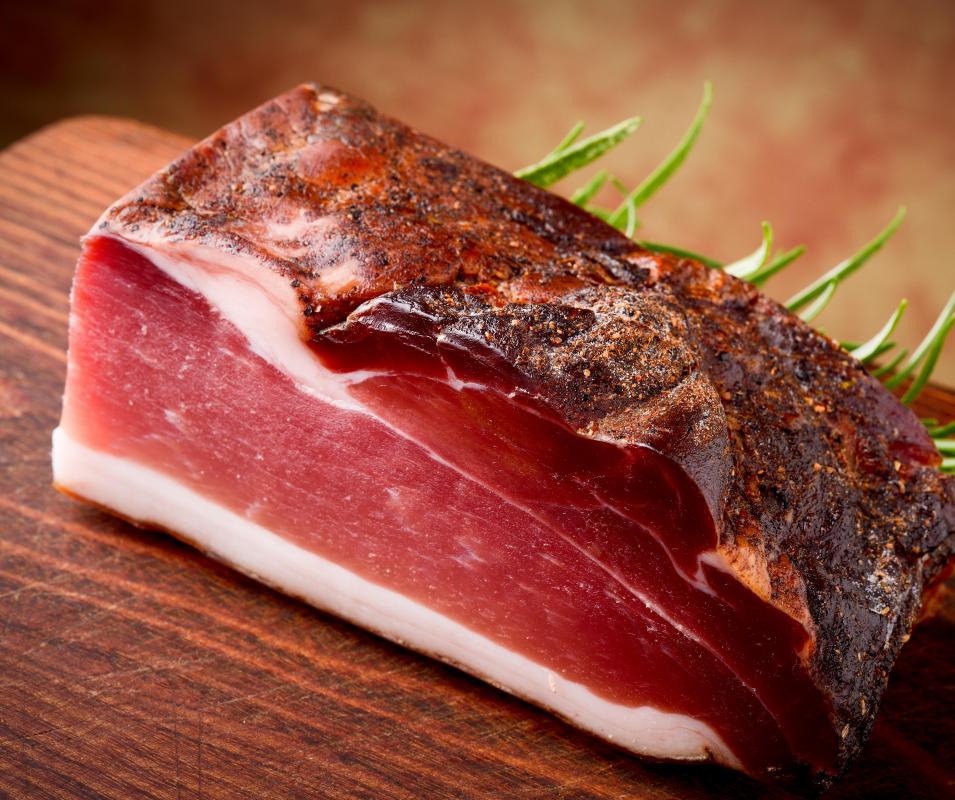At TheHealthBoard, we're committed to delivering accurate, trustworthy information. Our expert-authored content is rigorously fact-checked and sourced from credible authorities. Discover how we uphold the highest standards in providing you with reliable knowledge.
What Is Potassium Sorbate?
Potassium sorbate is a commonly used food preservative. Specifically, it is the crystalline salt of sorbic acid, also a food preservative. It is frequently used in the manufacture of mass-market cheeses, wines, meats, and dried fruits. Some cosmetics and personal care manufacturers use it, too, often because of how well the compound helps inhibit the growth of yeast and mold, thus extending shelf life. With a toxicity level comparable to table salt, the compound is generally considered safe for consumption; still, there is some controversy when it comes to whether the compound is the best preservative option where overall health is concerned. People who consume a lot of processed foods may take in much more than trace amounts, usually from various foods. Side effects are usually thought to be rare but may include mild allergic reactions and nausea.
Chemical Properties

From a chemical perspective, the additive is a complex polyunsaturated fat that carries the formula C6H7KO2. It looks a lot like regular table salt in most cases, as it has a grainy, white, crystalline structure. Also like salt, it does occur in nature, usually as a byproduct of processing mountain ash trees and bark. This form of extraction is believed to have been perfected by the French in the mid-1850s, but is time consuming and doesn’t usually yield enough to supply manufacturers’ demands. Synthetic processing is much more common today, and can be completed rather quickly by labs around the world.
As a Preservative

The compound is often most valuable because of its preservation abilities. It prevents unwanted decomposition, mold, and fungal and yeast production in many different substances, from very wet to very dry. All of these things will happen in untreated foods if given enough time. The compound is commonly added to such foods as cheese, yogurt, baked goods, dried or cured meats, and fish. The foods stay looking and tasting fresher as a result, and can dramatically improve shelf-life — which is often really important for items and in stores that don’t normally have a high product turnover. Some research has also suggested that the additive might also reduce the risk of disease by inhibiting microbial growth in food products.
Benefits in Wine Production

Wine makers also commonly add potassium sorbate to batches of fermented wines. It’s mostly used in sweeter wines, sparkling wines and sometimes even hard cider, though usually only in those that are intended for mass distribution. Small-volume vintners and those following traditional or ancient methods of wine production usually avoid preservatives, but most of their wine is usually designed to be consumed fairly quickly and doesn’t normally have to remain stable for shipping over long distances.
When it is used, the preservative stabilizes the wine in its final stage of production by attacking still active and surviving yeast, preventing further fermentation and changes in the wine. Many countries and national regulatory bodies require wine makers to disclose all ingredients and chemical additives on their labels, but not all do. For wine drinker who'd rather not consume additives or chemical salts, a filter may be used to remove it before consumption.
In Cosmetics
Similar to perishable foods and drink, many personal care items can grow mold unless a preservative is added. Potassium sorbate is a common addition to items such as shampoos, conditioners, lotions and cosmetics to help extend their shelf life. Most of the time it’s only used in very small quantities, but people with really sensitive skin may find the additive irritating, especially when applied and left to sit on the skin, as is often the case with lotions and most makeup products.
Controversy and Health Considerations
Potassium sorbate is widely regarded by most regulatory agencies and health investigators as safe when consumed or used in small amounts. Most of the controversy surrounding the additive’s use come from those who disagree with many parts of the processed food movement, including the processing that requires an increased shelf-life in the first place.
Food purists are often quick to claim that the best way to health is through eating foods that are locally produced and consumed almost immediately. In the modern global landscape, however, this isn’t always economically feasible or even possible at all. There are many different preservative options, though this one tends to be a popular one both because of how inexpensive and accessible it is, and also because it adds virtually nothing in terms of taste or texture.
AS FEATURED ON:
AS FEATURED ON:













Discuss this Article
Post your comments